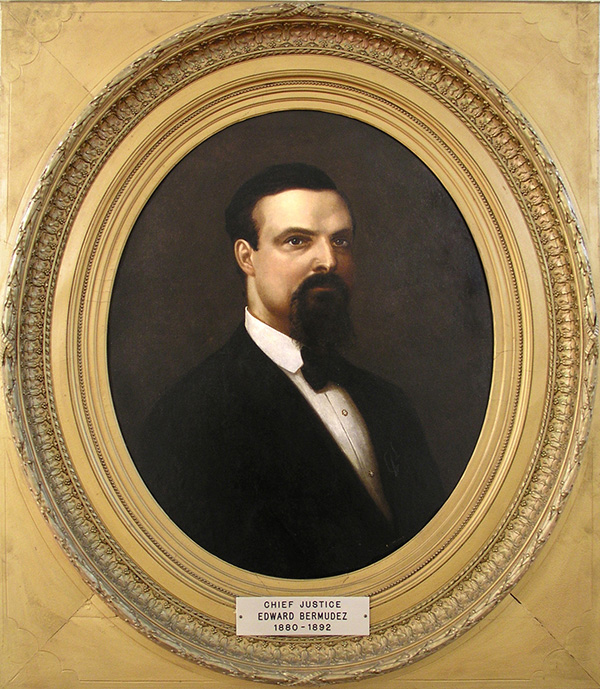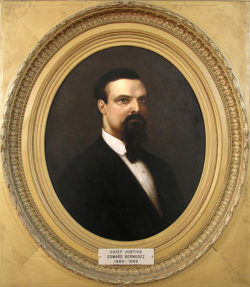Edward Bermudez
Edward Bermudez served as the chief justice of the Louisiana Supreme Court from 1880 to 1892.

Courtesy of The Law Library of Louisiana
Edward Bermudez. Unidentified
Edouard (Edward) Edmund Bermudez was the seventh chief justice of the Louisiana Supreme Court, serving in that capacity from April 5, 1880, to April 5, 1892. Known as the “Creole Chief Justice,” he rose to power at a time—decades after the Louisiana Purchase and the resulting influx of Americans—when his ethnic group was waning in social position. Bermudez brought rigorous scholarship in the civil law and unbending principles to the bench.
Bermudez was born in New Orleans on January 19, 1832, to Joaquim (Joachim) Bermudez and Marie Troxler Bermudez. Edward’s paternal grandfather, Juan Bautista Bermudez, had come to New Orleans to serve as a judicial functionary under the Spanish regime; he then married Marie Emelia Soniat Du Fossat, a member of the distinguished Soniat family. Edward’s mother was born in Louisiana to parents of French and German descent. His father, Joachim Bermudez, was judge of the Orleans Probate Court. As a young boy, Bermudez attended Boyer’s School in New Orleans and Spring Hill College in Mobile, Alabama, where he graduated with honors in 1851. In the summer of 1851, like many Louisiana students of the period, Bermudez studied common law at the Kentucky home of Judge Thomas B. Monroe, a US district judge for Kentucky and a professor of law at the University of Louisiana in New Orleans (later reorganized as Tulane University). When Bermudez returned from Kentucky, he entered the law department of the University of Louisiana. The course of study probably took about six months to complete, and Bermudez was granted the degree of Bachelor of Law in 1852. Later in his life, he received an honorary doctor of laws degree from St. John’s College at Fordham, New York.
Bermudez was admitted to the bar in Louisiana in 1853, just after his marriage to Elizabeth Amanda Maupassant. They had nine children, five of whom died at young ages. The city directory for 1853 records Edward Bermudez in his father’s law practice on Royal Street and his dwelling on St. Philip Street. In 1861, as support for secession grew in Louisiana, Bermudez was elected a delegate to the Louisiana Secession Convention in Baton Rouge. Although he was part of a group that did not favor immediate secession, he did vote in favor of the final secession ordinance, which passed at the convention. When the war began, Bermudez entered the Confederate army and was sent to Mobile, where he became judge advocate of his brigade. At the end of the war, he returned to New Orleans and was elected assistant city attorney for New Orleans until he was removed in 1867 by Gen. Philip Sheridan, who declared him an impediment to Reconstruction; Bermudez then resumed his law practice. In 1869 Bermudez acquired from his mother-in-law all the lots facing Washington Square in the Faubourg Marigny neighborhood of New Orleans. He and his extended family lived there in what was then the heart of the city’s Creole population.
Bermudez continued his successful private law practice and was counsel to several important corporations. His office became a training ground for young attorneys who went on to distinguished legal careers, and he traveled widely in the United States and France, where he had many friends in the judiciary. After Reconstruction self-government was restored to Louisiana, and a new constitution was written in 1879. Bermudez was appointed chief justice by Gov. Louis Alfred Wiltz, and the court organized on April 5, 1880. The new court had the arduous task of adjusting the law of the state to the new requirements of the Constitution of 1879. Henry Dart, legal historian and member of the bar during this period, described Bermudez thusly: “The seventh Chief Justice was a Creole, and yielded to none in pride of race and position.” Dart also mentions that, although Bermudez was proud of his Creole heritage, he had many American friends: “The Chief Justice was in 1880 in his prime—a big, vigorous man, with a will of iron. He was a ripe scholar in the texts of the civil law …” Chief Justice Bermudez once engaged a member of the faculty of the College d’Orleans in a duel. The gun fight, which ended happily for both parties, reflected the moral code of Creole society.
Bermudez served his full twelve-year term, as stipulated by the Louisiana Constitution of 1879, though he struggled to do so at the very end due to poor health. Bermudez died at his home of heart disease on August 22, 1892. He was interred in St. Louis Cemetery No. 3 in New Orleans.
Bermudez originated the idea of a portrait gallery of Louisiana justices; because of his initiative, the Louisiana Supreme Court today houses an impressive collection of portraits, which are displayed throughout the court building. After Bermudez’s death, his family presented a portrait that is displayed in the Law Library of Louisiana.
